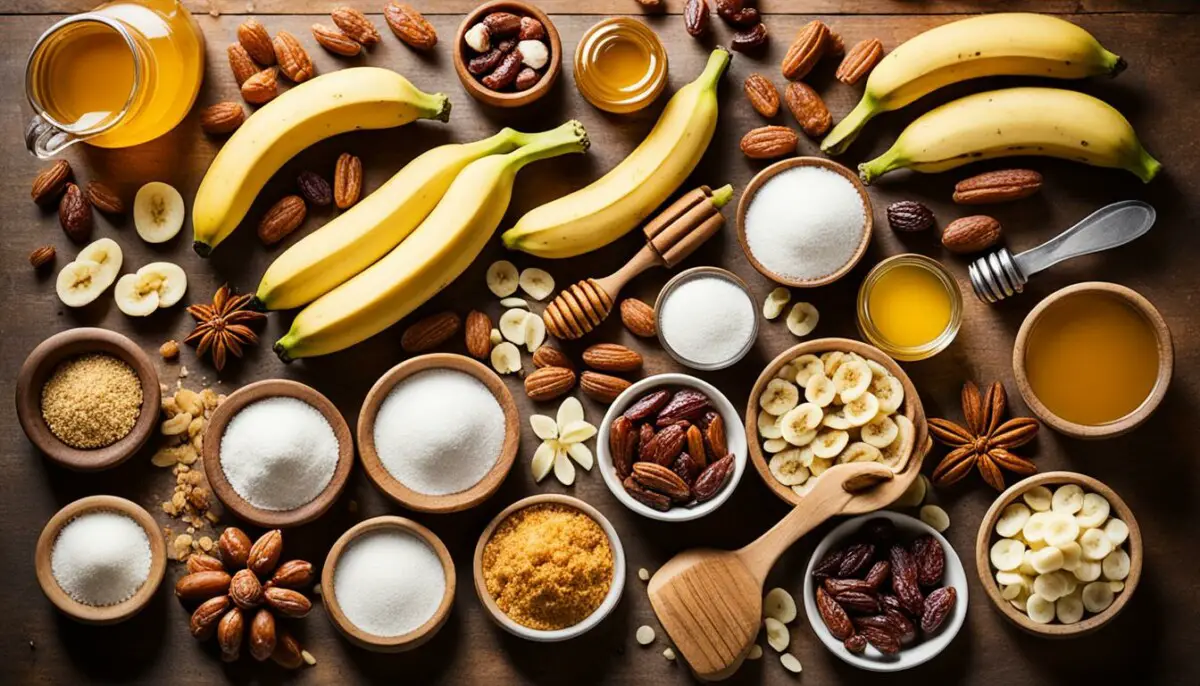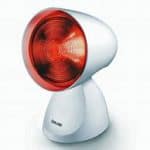Last Updated on 3 months by Francis
Do you love to bake but want to cut down on your sugar intake? Look no further! In this article, we will explore the world of sugar alternatives for baking. These natural sweeteners not only provide the sweetness you crave but also bring additional health benefits to your favorite treats.
Traditional sugar is high in calories and can lead to insulin spikes, making it less than ideal for those who are conscious of their health. But don’t worry, there are plenty of delicious and wholesome options that can be used as substitutes in your baking recipes.
Contents
Key Takeaways:
- Swap traditional sugar for natural sweeteners in your baking recipes.
- Sugar alternatives add flavor and sweetness without the negative health effects of regular sugar.
- Honey, maple syrup, applesauce, fruits, molasses, cane sugar, and coconut palm sugar are excellent options to try.
- Remember to use sugar substitutes in moderation, as they still contain calories.
- Experiment with different sugar alternatives to find your favorite healthy swaps for guilt-free baking.
Honey
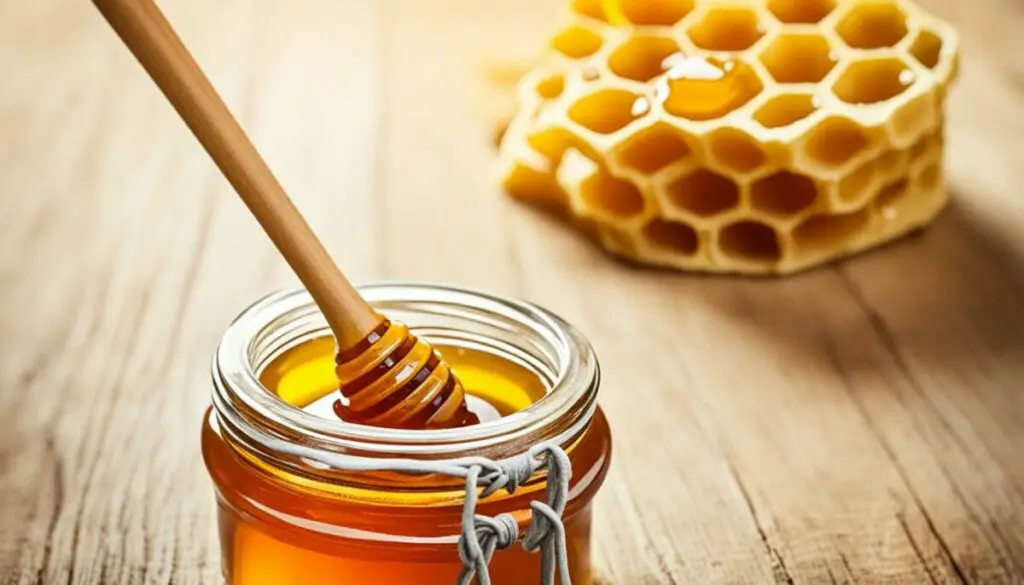
Honey is a versatile sugar substitute that can add both sweetness and health benefits to your baked goods. Not only does it provide a delicious flavor, but it also offers various nutrients and antioxidants.
When using honey as a sugar substitute in baking, you can typically substitute it in a 1:1 ratio or adjust according to your taste preferences. However, keep in mind that honey is still high in calories and should be consumed in moderation, especially if you are watching your calorie intake or have diabetes.
Honey is known for its antibacterial and anti-inflammatory properties, making it a healthier option compared to refined sugar. It also contains vitamins and minerals such as potassium, iron, and zinc.
“Honey adds a natural and unique sweetness to baked goods, enhancing their flavor and making them more enjoyable.”
In addition to its health benefits, honey can also help improve the texture and moisture of your baked goods. It creates a soft and tender crumb, making it a great choice for cakes, cookies, and breads.
| Nutrition Facts of Honey (per 1 tablespoon) | |
|---|---|
| Calories | 64 |
| Total Fat | 0g |
| Sodium | 1mg |
| Total Carbohydrate | 17g |
| Sugars | 16g |
| Protein | 0g |
Health Benefits of Honey:
- Rich in antioxidants that can protect against cell damage
- May help soothe coughs and sore throats
- Possible anti-inflammatory effects
- May aid in digestive health
To incorporate honey into your recipes, simply replace the amount of sugar called for with an equal amount of honey. Keep in mind that honey has a slightly different flavor profile, so your baked goods may have a subtle honey taste.
Enjoy the natural sweetness and health benefits that honey brings to your baking!
Maple Syrup
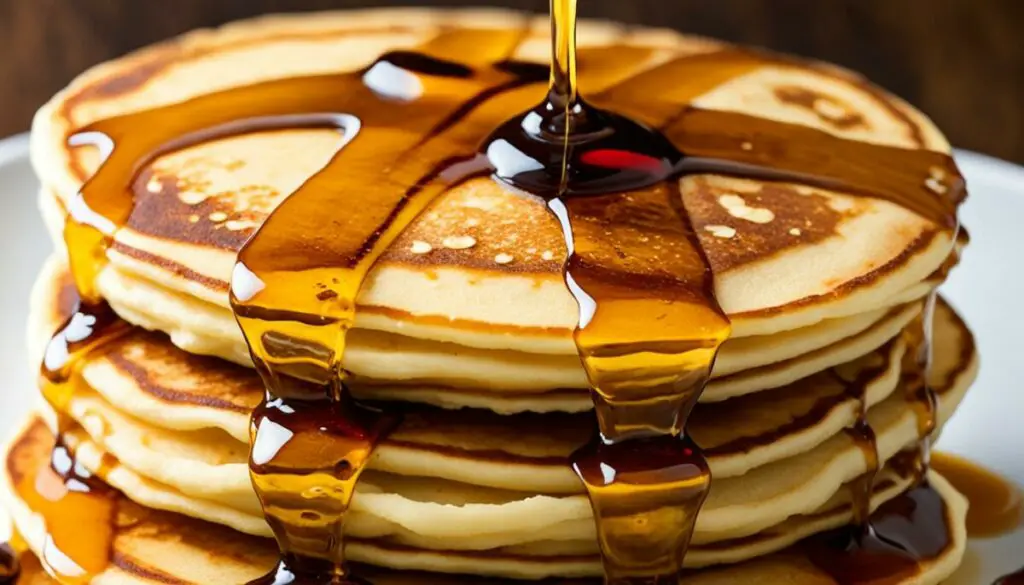
Maple syrup is a delicious and nutritious alternative to sugar in baking. It contains antioxidants, minerals like calcium and iron, and has a lower glycemic index than table sugar. This means it has a slower impact on blood sugar levels. Maple syrup can be used as a substitute for sugar in a 1:1 ratio and adds a rich, caramel-like flavor to baked goods.
Maple syrup is not only a sweetener but also a source of essential nutrients. It contains minerals like calcium, iron, zinc, and manganese, which are crucial for maintaining healthy bones and aiding in various bodily functions. Additionally, pure maple syrup is rich in antioxidants, which help protect the body against oxidative stress and inflammation.
Another advantage of using maple syrup as a sugar alternative is its lower glycemic index. The glycemic index measures the impact of carbohydrates on blood sugar levels. Foods with a low glycemic index are absorbed more slowly, causing a gradual rise in blood sugar levels. This is beneficial for individuals looking to manage their blood sugar levels, especially those with diabetes or those following a low-glycemic diet.
When using maple syrup in baking, it is important to keep in mind that it has a distinct flavor. Its natural caramel-like taste can enhance the overall flavor profile of baked goods, adding depth and complexity. However, it is recommended to adjust the other flavors and ingredients accordingly to achieve a balanced taste.
“Using maple syrup as a sugar substitute in baking not only adds sweetness but also offers a unique flavor and potential health benefits.”
Maple syrup can be used in a variety of baked goods, including pancakes, muffins, cakes, and cookies. Here are some popular recipes that utilize maple syrup:
- Maple syrup oatmeal cookies
- Maple walnut muffins
- Maple cinnamon rolls
- Maple pecan pie
Experimenting with maple syrup in your baking can be a tasty and health-conscious way to reduce your reliance on refined sugar. However, it’s important to remember that maple syrup is still a sweetener and should be consumed in moderation as part of a balanced diet.
Applesauce
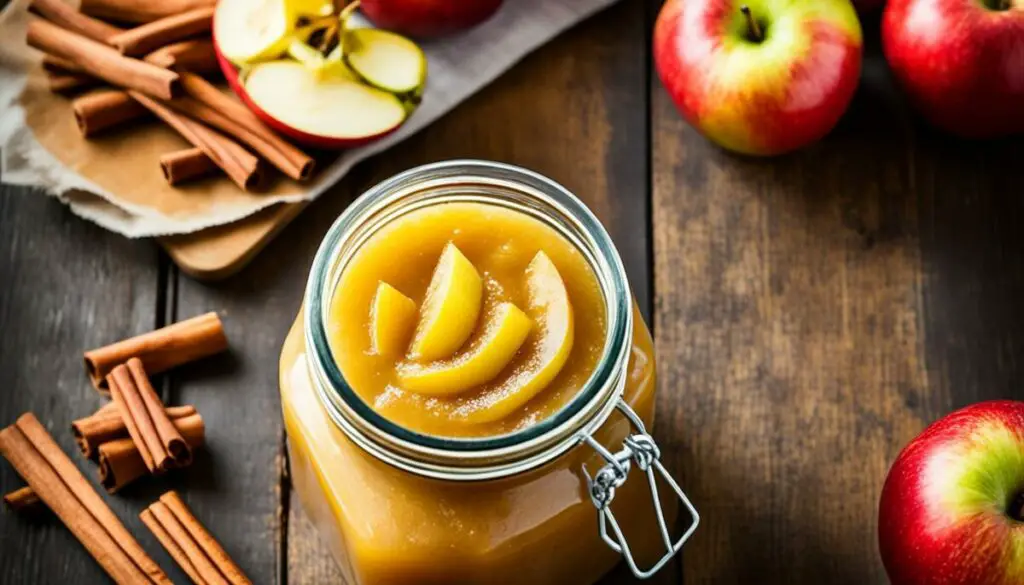
Applesauce is a versatile sugar substitute that can be used in baking to reduce calories and add moisture. It is a great option for those looking for healthier baking alternatives. Not only does applesauce provide natural sweetness, but it also offers additional health benefits.
When using applesauce as a sugar substitute, it is crucial to choose unsweetened brands or make your own to avoid added sugars. This ensures that you are using a pure and healthy substitute in your recipes.
One of the advantages of using applesauce in baking is its ability to add moisture to the final product. This can be particularly useful in recipes that tend to be dry, such as cakes or muffins. By incorporating applesauce, you can achieve a moist texture without relying on excess oil or butter.
Another benefit of using applesauce as a substitute is its fiber content. Applesauce is rich in dietary fiber, which can promote digestive health and help you feel fuller for longer. This can be especially beneficial for individuals looking to manage their weight or follow a healthy eating plan.
Applesauce can also be used as an egg substitute in recipes, making it a fantastic option for vegan baking. Replace each egg with ¼ cup of unsweetened applesauce to achieve the desired moisture and binding properties in your baked goods.
Applesauce Calories and Nutritional Value
Unsweetened applesauce is low in calories, making it an excellent choice for those looking to reduce their calorie intake. Here is a breakdown of the approximate nutritional value of 1 cup (244 grams) of unsweetened applesauce:
| Nutrient | Amount |
|---|---|
| Calories | 105 |
| Carbohydrates | 27 grams |
| Fiber | 4 grams |
| Sugar | 21 grams |
| Protein | 0 grams |
| Fat | 0 grams |
As seen from the table above, unsweetened applesauce contains about 105 calories per cup and is free of fat and protein. It is primarily a source of carbohydrates and provides a moderate amount of dietary fiber.
Overall, applesauce is a healthy and delicious sugar substitute that can be used in a variety of baking recipes. Whether you’re looking to reduce calories, add moisture to your baked goods, or follow a vegan diet, applesauce is a versatile ingredient that offers numerous benefits.
Fruits

Fruits are not only delicious but also make excellent additions to a low-sugar diet. They provide natural sweetness and a wide range of nutrients, including fiber, potassium, and various minerals. When it comes to baking, fruits like bananas, figs, dates, and raisins can act as fantastic sugar substitutes, adding flavor and natural sweetness to your recipes without the need for refined sugar.
Bananas, for example, can be mashed and used as a natural sweetener in a variety of baked goods. Their creamy texture and mild sweetness make them a versatile ingredient. Dates, figs, and raisins, on the other hand, can be blended or chopped and used as sweeteners in muffins, cookies, and cakes, infusing them with a delightful taste and moist texture.
Using fruits as natural sweeteners not only helps reduce the overall sugar content in your baked treats but also provides numerous health benefits. The fiber found in fruits helps slow down the release of sugars into the bloodstream, preventing spikes in blood sugar levels. Additionally, the vitamins and minerals present in fruits are essential for overall well-being.
If you’re looking to make your baking endeavors healthier and more nutritious, incorporating fruits as natural sweeteners is a great option. Not only will you be able to satisfy your sweet tooth, but you’ll also be treating your body to the goodness of whole, natural ingredients.
Health Benefits of Using Fruits as Sweeteners:
- Provide natural sweetness
- Offer additional nutrients like fiber, potassium, and minerals
- Help reduce overall sugar content in baked goods
- Contain vitamins and minerals essential for overall well-being
- Contribute to a low-sugar diet
“Incorporating fruits as natural sweeteners in your baking not only adds flavor but also boosts nutritional value.” – Dr. Emily Stevens, Nutritionist
Molasses

Molasses, a byproduct of processing sugar, is an excellent alternative sweetener for baking. While it may be less sweet than sugar, its distinct flavor can enhance the taste of a variety of baked goods. Additionally, molasses provides essential nutrients such as iron, calcium, and vitamins, making it a healthier choice compared to refined sugar.
When using molasses as a sugar substitute, it’s important to note that its flavor profile pairs exceptionally well with certain recipes, such as gingerbread cookies or dark chocolate brownies. Its richness adds a unique depth of flavor that can take your baked goods to the next level.
So, why not give molasses a try in your next baking adventure? Its enhanced flavor and nutritional benefits make it a wonderful addition to your pantry. Let your taste buds indulge in the delightful combination of flavors that molasses brings to your favorite treats.
The Benefits of Molasses as a Sugar Substitute
Molasses not only adds enhanced flavor to baked goods but also offers several health benefits. Here are some of the key advantages of using molasses as a sugar substitute:
| Benefits | Description |
|---|---|
| Rich in minerals | Molasses contains iron, calcium, magnesium, and potassium, which are essential for maintaining good health. |
| Source of antioxidants | Molasses contains antioxidants that help protect the body against cell damage caused by free radicals. |
| Increased iron intake | Molasses is a great source of iron, making it an ideal sweetener for individuals with iron deficiencies. |
| Natural sweetness | Although molasses is less sweet than sugar, its distinct flavor makes it an excellent choice for enhancing the taste of baked goods. |
With its unique flavor and nutritional benefits, molasses is a versatile sugar substitute that can elevate the taste and healthiness of your homemade treats. So, why not add a touch of molasses to your next baking recipe and savor the enhanced flavor it brings?
Cane Sugar
Cane sugar, an unrefined sugar, offers a healthier alternative to its more processed counterpart, refined white sugar. Unlike white sugar, cane sugar retains more vitamins and minerals through a less extensive refining process. It contains glucose, fructose, and sucrose, making it a versatile option for baking. However, it’s important to consume cane sugar in moderation, as it is still high in calories.
When substituting cane sugar in your recipes, you can typically use it as a 1:1 replacement for refined white sugar. This means you can enjoy the same level of sweetness in your baked goods while incorporating a more natural and unprocessed sweetener. The result is a delicious treat with potentially added nutritional benefits.
One way to incorporate cane sugar into your baking is by using it in recipes that call for brown sugar. You can create a DIY brown sugar substitute by combining cane sugar with a small amount of molasses. Simply mix 1 cup of cane sugar with 1 to 2 tablespoons of molasses to achieve the desired flavor and moisture.
Benefits of Cane Sugar:
- Nutrient-Rich: Compared to refined white sugar, cane sugar retains more vitamins and minerals due to its less refined nature.
- Flavorful: Cane sugar adds a distinct flavor to baked goods, enhancing the overall taste of your creations.
- Unrefined: As an unrefined sugar, cane sugar undergoes less processing, making it a more natural and wholesome choice.
By choosing cane sugar as a healthier alternative to refined white sugar, you can enjoy the sweetness you love while incorporating a more nutrient-rich and unprocessed ingredient into your baking. Remember, moderation is key when it comes to sugar consumption, so be mindful of your overall intake.
Coconut Palm Sugar
Coconut palm sugar is a natural sweetener with a lower glycemic index than regular sugar. Derived from coconut tree sap, it offers a delicious sweetness and flavor comparable to regular sugar, making it an excellent substitute in baking. But its benefits extend beyond the kitchen.
For those concerned about blood sugar levels, coconut palm sugar is a great option. With its low-glycemic index, it has a slower impact on blood sugar levels compared to traditional sugar. People with diabetes or those looking for a diabetic-friendly sweetener can enjoy coconut palm sugar in moderation without drastic spikes in their blood sugar.
In addition to baking, coconut palm sugar can be sprinkled on oatmeal or added to popcorn for a touch of natural sweetness. Its versatility makes it a staple in many households seeking healthier alternatives to traditional sugar.
While coconut palm sugar offers benefits, it is important to remember to consume it in moderation. Despite being a healthier option, it still contains calories and should be part of a balanced diet.
Health Benefits of Coconut Palm Sugar
Coconut palm sugar not only provides a lower-glycemic alternative to traditional sugar but also offers several health benefits. Here are some key advantages:
- Rich in vitamins and minerals: Coconut palm sugar contains essential vitamins and minerals such as iron, potassium, zinc, and calcium, making it a nutrient-rich choice.
- Rich in antioxidants: Antioxidants help protect the body against free radicals, reducing the risk of chronic diseases and promoting overall health and well-being.
- Unrefined and natural: Unlike refined sugars, coconut palm sugar undergoes minimal processing, retaining more of its natural nutrients and flavors.
By incorporating coconut palm sugar into your baking and cooking, you can enjoy a naturally sweet flavor while reaping the nutritional benefits it provides.
| Coconut Palm Sugar vs. Regular Sugar | Coconut Palm Sugar | Regular Sugar |
|---|---|---|
| Glycemic Index | Low | High |
| Nutritional Content | Rich in vitamins and minerals | Minimal nutritional value |
| Processing | Minimal processing, unrefined | Highly refined |
| Health Benefits | Rich in antioxidants, minerals, and nutrients | Minimal nutritional benefits |
Conclusion
In conclusion, if you’re looking for sugar alternatives for baking, there are plenty of healthy options to choose from. By swapping out traditional sugar for natural sweeteners, such as honey, maple syrup, fruits, or coconut palm sugar, you can add sweetness to your baked goods while also reaping additional health benefits.
It’s important to use these alternatives in moderation, as they still contain calories. Remember, a balanced diet is key. However, by incorporating these healthy sugar alternatives into your baking, you can reduce your overall sugar intake and enjoy guilt-free treats.
Don’t be afraid to get creative and experiment with different substitutes. Whether you’re using honey to add a touch of sweetness or applesauce to add moisture and reduce calories, baking with natural sweeteners can add variety and a unique flavor profile to your creations.
So go ahead and try these healthy swaps in your next baking adventure. Your taste buds and your health will thank you!
FAQ
Why should I use sugar alternatives for baking?
Sugar alternatives offer a healthier option for those who want to reduce their calorie intake and avoid insulin spikes. They provide sweetness while also offering additional health benefits.
How can honey be used as a sugar substitute in baking?
Honey can be used as a 1:1 substitute for sugar in baking recipes. However, it’s important to note that honey is still high in calories and should be consumed in moderation.
What are the benefits of using maple syrup as a sugar alternative in baking?
Maple syrup is a nutritious alternative that contains antioxidants, minerals, and has a lower glycemic index than table sugar. It can be used as a 1:1 substitute for sugar and adds a rich flavor to baked goods.
How can applesauce be used as a sugar substitute in baking?
Applesauce can be used as a sugar substitute to reduce calories and add moisture to baked goods. It can also be used as an egg substitute in recipes, making it a great option for vegan baking. It’s important to choose unsweetened brands or make your own to avoid added sugars.
How can fruits like bananas, figs, dates, and raisins be used as sugar substitutes in baking?
These fruits can be mashed, blended, or chopped and used as natural sweeteners in baking. They add sweetness and provide additional nutrients like fiber, potassium, and minerals.
How can molasses be used as an alternative sweetener in baking?
Molasses can be used as a sugar substitute to add a distinct flavor and enhance the taste of certain baked goods. It provides some iron, calcium, and vitamins. While it is less sweet than sugar, it adds a unique depth of flavor to recipes.
What is cane sugar and how can it be used as a healthier substitute for baking?
Cane sugar is a less processed version of sugar that retains more vitamins and minerals. It can be used as a healthier substitute for baking, but it is still important to use it in moderation as it is high in calories.
What are the benefits of using coconut palm sugar as a sugar alternative in baking?
Coconut palm sugar has a lower glycemic index than regular sugar, making it a diabetic-friendly option. It provides similar sweetness and flavor to regular sugar and can be used as a substitute in baking. However, it should still be consumed in moderation.
Can sugar alternatives be used in baking without affecting the taste of the final product?
Yes, sugar alternatives can be used in baking without significantly affecting the taste of the final product. However, each alternative may have a slightly different flavor profile, so it may be necessary to experiment and adjust recipes accordingly.
Can sugar alternatives be used in all types of baking recipes?
Yes, sugar alternatives can be used in a variety of baking recipes, including cakes, cookies, muffins, and bread. However, some adjustments may be needed in terms of ratios and cooking times, as sugar alternatives can have different properties than traditional sugar.

